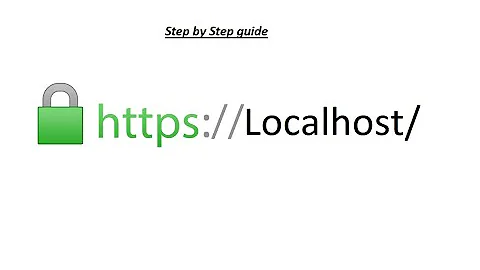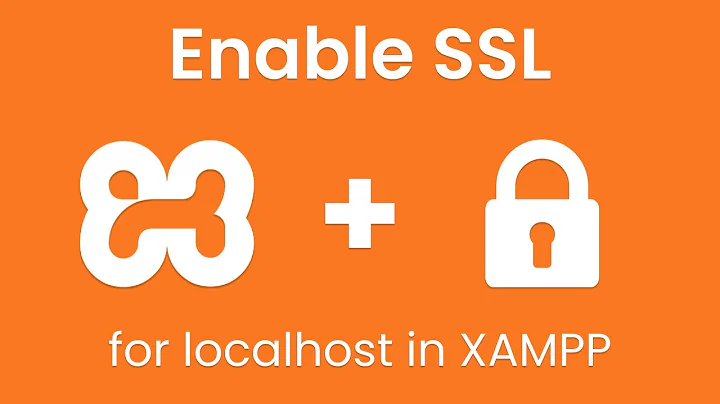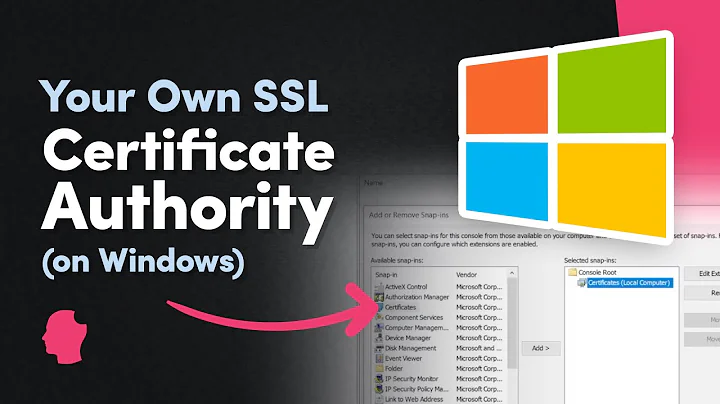Creating a *.local ssl certificate
Solution 1
You added SAN to the CSR but you didn't tell ca to include extensions from the CSR in the certificate. See
https://security.stackexchange.com/questions/150078/missing-x509-extensions-with-an-openssl-generated-certificate or the man page for ca also on the web at copy_extensions
EDIT: You also need to specify x509_extensions in the ca config, or equivalent but less convenient the commandline option -extensions, in either case pointing to a section that exists but can be empty if you don't want any CA-required extensions. I didn't notice this at first because I had never tried the case of extensions from CSR only and not config, which is unrealistic for most CAs. If you specify copy_extensions other than none (and the CSR has some) but don't specify x509_extensions then ca does put the extensions in the cert but does not set the cert version to v3 as is required by standards (like rfc5280) when extensions are present.
It's arguable if this is a bug; the manpage says x509_extensions/extensions controls the v3 setting, and by not saying any similar thing about copy_extensions implies that does not, but IMHO it's certainly a very suboptimal feature. EDIT: it is a bug and will be fixed but until then use the workaround, see https://unix.stackexchange.com/a/394465/59699
HOWEVER: in my test, this didn't actually solve your problem. Even though the cert has *.local in SAN and CN and is (now) otherwise valid, my Firefox (53.0.2) and Chrome (59.0.3071.109) still reject it with SSL_ERROR_CERT_DOMAIN_ERROR and ERR_CERT_COMMON_NAME_INVALID respectively. I guessed they might not be excluding local from the normal 2+-level logic and tried *.example.local: Chrome does accept that, but Firefox doesn't. I also tried *.example.org and both Chrome and IE11 like that but still not Firefox (and of course assigning yourself names in real TLDs like .org is not the way DNS is supposed to work).
This has me stuck. With some work OpenSSL can be made to generate a cert containing almost anything you want, but what Firefox and Chrome will accept I do not know. I will try to look into that and update if I find anything.
I hope you mean you gave *.local as the CommonName only for the server CSR and NOT for the CA (self-signed) cert. If Subject names for CA and leaf certs are the same nothing will work reliably. EDIT: your edited Q confirms they were correctly different. Although it does not mention also specifying Country, State, and Organization as is required by the ca policy you used.
Note 'self-signed' is a term of art and means signed with the same key. Your CA cert is self-signed. Your server cert is signed by you yourself using your own key but it is not self-signed. Trying to apply instructions for a self-signed cert to a not-self-signed cert was part of your problem.
And Gilles point about md5 for the signature algorithm is also correct.
EDIT: 'resetting' serial (and index) for an openssl ca setup is a bad idea, unless you permanently discard the CA cert and name they were used for. The standards say a given CA must not issue more than one cert with the same serial value in the cert, and the serial file is the way openssl ca (and also x509 -req) implements this. 'Real' (public) CAs nowadays no longer use a simple counter but include entropy to block collision attacks on PKI -- google hashclash -- but this is not an issue for a personal CA like yours. I can readily believe a browser (or other relier) being unhappy if it sees multiple certs with the same serial and CA name, although I would NOT expect a browser to persistently store a leaf cert -- and thus see both the old and new ones in one process unless long-running -- unless you import it to the applicable store, including in Firefox if you make it a permanent 'exception'.
Solution 2
Wildcard certificates are not permitted for a top-level domain like .local or .com and they aren't accepted by Firefox or IE either. https://crbug.com/736715.
Related videos on Youtube
Jonathan Hodgson
Updated on September 18, 2022Comments
-
 Jonathan Hodgson over 1 year
Jonathan Hodgson over 1 yearI am trying to set up a single SSL certificate that will make any *.local website work over https. I have all .local domains pointing back to my local machine. I use these when developing websites. A lot of new features (geo location, service workers etc.) require an SSL.
I believe that for recent versions of Chrome/Firefox, an old school self-signed certificate no longer works.
Below are the steps I have taken after following a combination of these guides: https://deliciousbrains.com/https-locally-without-browser-privacy-errors/
Here is my config file:
#.................................. [ ca ] default_ca = CA_default [ CA_default ] dir = /home/*****/Sites/root-ca serial = $dir/serial database = $dir/index.txt new_certs_dir = $dir/certs certificate = $dir/certs/cacert.pem private_key = $dir/private/cakey.pem default_days = 3000 default_md = sha256 preserve = no email_in_dn = no nameopt = default_ca certopt = default_ca policy = policy_match copy_extensions = copyall [ policy_match ] countryName = match stateOrProvinceName = match organizationName = match organizationalUnitName = optional commonName = supplied emailAddress = optional [ req ] default_bits = 2048 # Size of keys default_keyfile = key.pem # name of generated keys default_md = md5 # message digest algorithm string_mask = nombstr # permitted characters distinguished_name = req_distinguished_name req_extensions = v3_req [ req_distinguished_name ] # Variable name Prompt string #------------------------- ---------------------------------- 0.organizationName = Organization Name (company) organizationalUnitName = Organizational Unit Name (department, division) emailAddress = Email Address emailAddress_max = 40 localityName = Locality Name (city, district) stateOrProvinceName = State or Province Name (full name) countryName = Country Name (2 letter code) countryName_min = 2 countryName_max = 2 commonName = Common Name (hostname, IP, or your name) commonName_max = 64 # Default values for the above, for consistency and less typing. # Variable name Value #------------------------ ------------------------------ 0.organizationName_default = ***** localityName_default = ***** stateOrProvinceName_default = ***** countryName_default = ***** emailAddress_default = ***** [ v3_ca ] basicConstraints = CA:TRUE subjectKeyIdentifier = hash authorityKeyIdentifier = keyid:always,issuer:always subjectAltName = @alternate_names [ v3_req ] subjectKeyIdentifier = hash basicConstraints = CA:FALSE keyUsage = digitalSignature, keyEncipherment subjectAltName = @alternate_names nsComment = "OpenSSL Generated Certificate" [ alternate_names ] DNS.1 = *.localI first create a new certificate authority:
openssl req -new -x509 -extensions v3_ca -keyout private/cakey.pem -out certs/cacert.pem -days 3000 -config conf/caconfig.cnfI have given the Common name here as my name
Common Name (hostname, IP, or your name) []:Jonathan HodgsonThe file
certs/cacert.pemI then import into chromium's authorities which works without a problem.I then create a certificate request:
openssl req -extensions v3_req -new -nodes -out local.req.pem -keyout private/local.key.pem -config conf/caconfig.cnfI have given the Common name here as *.local
Common Name (hostname, IP, or your name) []:*.localI then sign the request:
openssl ca -out certs/local.cert.pem -config conf/caconfig.cnf -infiles local.req.pemI add the files to my http config:
<VirtualHost *:80> ServerName test.local ServerAlias *.local VirtualDocumentRoot /home/jonathan/Sites/%-2/public_html CustomLog /home/jonathan/Sites/access.log vhost_combined ErrorLog /home/jonathan/Sites/error.log </VirtualHost> <VirtualHost *:443> ServerName test.local ServerAlias *.local VirtualDocumentRoot /home/jonathan/Sites/%-2/public_html CustomLog /home/jonathan/Sites/access.log vhost_combined ErrorLog /home/jonathan/Sites/error.log SSLEngine On SSLCertificateFile /home/jonathan/Sites/root-ca/certs/local.cert.pem SSLCertificateKeyFile /home/jonathan/Sites/root-ca/private/local.key.pem </VirtualHost>I have restarted apache but I am still getting
NET::ERR_CERT_COMMON_NAME_INVALIDI was under the impression that this was because I needed to add the subjectAltName to the config file which I have done.
Please let me know what I should do differently.
Thanks in advance for any help
Edit
I think the problem is to do with the wildcard. If I set the alternate_names to example.local and the Common name for the request to example.local, example.local shows as secure in both Chrome and Firefox.
I tried to set DNS.1 to
localand DNS.2 to*.local, I then just gotERR_SSL_SERVER_CERT_BAD_FORMATin chrome andSEC_ERROR_REUSED_ISSUER_AND_SERIALin firefox. I definitely reset my serial file and my index file before generating the certificates. -
 Jonathan Hodgson almost 7 yearsThanks for looking over it. I have changed from md5 to sha256. Re-run all the commands and re-imported the CA certificate into chrome. It's still not working
Jonathan Hodgson almost 7 yearsThanks for looking over it. I have changed from md5 to sha256. Re-run all the commands and re-imported the CA certificate into chrome. It's still not working -
 Jonathan Hodgson almost 7 yearsHi, thanks for your help. I am not entirely sure how I add the copy_extentions. Should this be part of my config file or a flag on one of the commands? I used the common name *.local when generating the request. The Common name for the authority (the first command I ran) I used my name
Jonathan Hodgson almost 7 yearsHi, thanks for your help. I am not entirely sure how I add the copy_extentions. Should this be part of my config file or a flag on one of the commands? I used the common name *.local when generating the request. The Common name for the authority (the first command I ran) I used my name -
 Jonathan Hodgson almost 7 yearsI also re-started apache
Jonathan Hodgson almost 7 yearsI also re-started apache -
dave_thompson_085 almost 7 years@JonathanHodgson:
copy_extensions(s not t, spelling matters!) goes in the config file; that's why it's documented under the subheading 'Configuration File Options'. It goes in the sectioncauses directly (not via reference) which in your case is[CA_default] -
 Jonathan Hodgson almost 7 yearsThanks. I have added
Jonathan Hodgson almost 7 yearsThanks. I have addedcopy_extensions = copyallto the [CA_default] section. Re run the commands, restarted apache, re-imported the authority cert into chrome and still have the issue. Thanks for helping -
 Jonathan Hodgson almost 7 yearsthanks for clarifying what a self signed certificate is. Is there anything else I should be changing as a result of my mistake?
Jonathan Hodgson almost 7 yearsthanks for clarifying what a self signed certificate is. Is there anything else I should be changing as a result of my mistake? -
dave_thompson_085 almost 7 years@JonathanHodgson: on testing, yes; editing
-
 Jonathan Hodgson almost 7 yearsThanks @dave_thompson_085 , I have created an issue on Chromium's issue tracker here
Jonathan Hodgson almost 7 yearsThanks @dave_thompson_085 , I have created an issue on Chromium's issue tracker here




